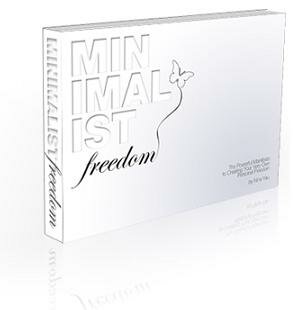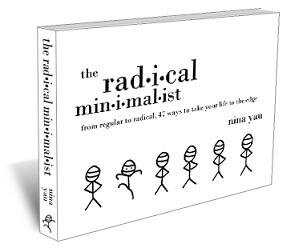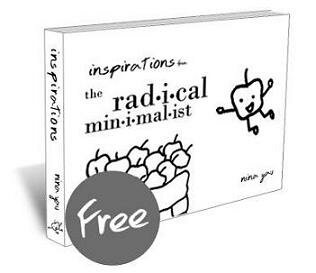The Minimalist Revolution: It’s Here and How You Can Join It

Nobody can give you freedom. Nobody can give you equality or justice or anything. If you’re a man, you take it. – Malcolm X
Minimalism and simple living has always been more than just a passing curiosity. It’s almost as if those folks who have never thought about reducing their excess stuff view minimalists or those who live a very simple life as an anomaly. Not necessarily as freakish, though some do think it’s a pretty crazy and “radical” lifestyle.
What I tell them is that consumerism is crazy and unsustainable. Over time, it will do more harm than good.
And we’re trying to combat the harm. The harm we inflict upon ourselves when we hoard that which can be lost, stolen, broken or destroyed. The harm we inflict upon our family when we pass away, leaving hundreds of stale, dusty boxes for them to sift through, oftentimes too much of a burden that they leave it alone, thereby continuing the vicious cycle. The harm we inflict upon our earth. With the excess things we own, this means we shop and buy things we really do not need, things that do not make us happy. Such things go through a cumbersome process of having to be made. Innumerable resources go into such materials, resources such as trees, time, labor, money, space, machinery.
What you have been reading on this blog and perhaps several other minimalist and simple living bloggers, such as:
- Everett Bogue
- Joshua Becker
- Leo Babauta
- Francine Jay
- Colin Wright
- Courtney Carver
- Tammy Strobel
- Mike Donghia
- Matt Madeiro
- Dusti Arab
- John Anyasor
… is that minimalism is not only a way of life for us, the writer behind the blog. It is a way of life we would love for others to join in.
I’m not here to forcefully “convert” you to minimalism, as if this was some sort of religious way of life. No, far from it. What my hope is, through reading this blog, is that it will somehow inspire you for change. Change for the better. Change from the old ways of thinking to the new ways. And don’t get me wrong, change is hard. Very hard.
As Robert F. Kennedy said, “Progress is a nice word but change is its motivator. And change has its enemies.”
How the Minimalist Revolution Begun
We often love to stand in the way of change, knowingly or not. We make excuses to ourselves as to why we cannot change rather than find ways we can. We wave off change as a non-issue and something that we just don’t have time to deal with now. What we know is what is working for us now.
But how do we know this is the best way to do things? The best way to live our lives, to save our planet, to save each other?
We don’t, unless we try things out. We open our minds to change. We take risks. We take a bold stand for what we believe in. And those who agree, those who want change in their lives, they will join us for the fight.
This is how the minimalist revolution begun. Starting with just a few key individuals, ranging from Lao Tzu (in the early B.C.) to Henry David Thoreau (1817-1862) to Mahatma Gandhi (1869-1948). From there, the revolution picked up speed, adopted by younger, newer generations with better, faster ways of spreading the news.
The news is this:
The minimalist revolution is here. You can either join us or get out of the ****ing way.
We are not looking for idle, passive people. We are not looking for those who just say or do things to please others, to not cause a ruckus, to stay in between the lines of conformity. We are simply not looking for such folks.
What we are looking for are change-makers. World changers. Those who fear not the risks or challenges that is associated with standing for something you believe in. We want those with passion and drive to put the principles into action.
The Motivator Behind the Minimalist Revolution
The key motivator behind the minimalist revolution is freedom. And freedom comes in many forms and means a different thing for each person.
Freedom can mean freedom of speech. The right to freely vote. Freedom can mean the choice of which job you take, which company or organization you work for. Freedom can mean who you choose to spend your life with. Freedom can mean not being limited to how many children you can have (such as the one-child policy in China). Freedom can mean an elimination of physical and emotional clutter so that we can focus on what makes us happy and fulfilled. Freedom can be as simple as doing what you will with your house, putting up a fence if you want it, or building a tree house for your child in your backyard.
Freedom is a powerful word and one that is not to be taken lightly.
Minimalist Freedom
I will have a powerful new manifesto launching on January 1, 2011 that will cover exactly what I’ve been talking about here. It will be free because this message needs to be heard, far and wide. I do not want money to be a barrier to an invaluable and timeless message.
I’ve freed myself from bondage to things. From bondage to a job I disliked in an area which brings me no joy or fulfillment. I’ve freed myself and I know what it feels. It’s something I wish others can experience. To take freedom by the reins and do something with it.
But alas, most people look at it with nothing more than a passing glance, then casually walk on by. “It’s not for me,” they say.
And as for others? They want it. Badly. They want to be free. And if you want something bad enough and are willing to work hard for it, to take a stand for what you believe in, freedom will indeed be yours.
Subscribe for free: |

 My name is Nina Yau, author of
My name is Nina Yau, author of 







